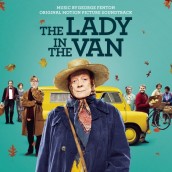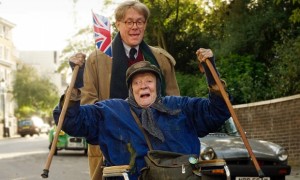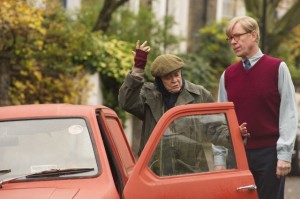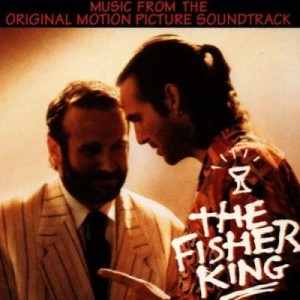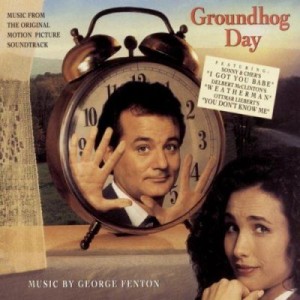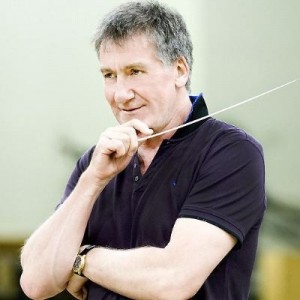If one might have the cliched attitude of old school English composers as adhering rigorously to the classically imperious music of Queen and Country, then they likely haven’t heard much of George Fenton’s prolific work over the last four or so decades, let alone had a crotchety, crazy old lady parked in their driveway for fifteen of them.
Not only has Fenton contributed one of his most delightfully attitude-filled scores to represent THE LADY IN THE VAN, but he also has the distinction of having actually met the fearsome Ms. Shepherd, a curmudgeonly homeless woman who became a grudgingly accepted thorn in the side of playwright and screenwriter Alan Bennett (PRICK UP YOUR EARS). Now his autobiographical experience in dealing with a musically-inclined visitor from hell (or course played by Maggie Smith) has resulted in a wonderfully unsentimental dramedy by Nicholas Hytner, marching to the brassy, classically humorous rhythms of Fenton’s score to strike terror into the creativity of any writer trying to get work done, let alone get along with his neighbors.
That the fictionalized Bennett (enacted by Alex Jennings) actually splits into two personas to snarkily observe his own weakness in the overwhelming storm (and shit) of his houseguest has opened up a floodgate of demanding brass and deviously pleading violins, along with true piano empathy from Fenton’s delightful and unexpectedly moving score. He marches in cantankerous lock-step with Hytner’s drolly humanistic film, their sixth collaboration together after the likes of THE MADNESS OF KING GEOGE, THE OBJECT OF MY AFFECTION and their adaptation of Bennett’s THE HISTORY BOYS.
But even if Miss Shepherd isn’t going anywhere as Fenton trounches her into Bennett’s life with waltzing, circus-like aplomb, the same certainly can’t be said of a composer with over a hundred scores to his credit. Traversing both sides of the pond since his breakthrough soundtracks for GANDHI and JEWEL IN THE CROWN, the oft Oscar-nominated Fenton has displayed epic sweep (IN LOVE AND WAR, ANNA AND THE KING), literate melody (A HANDFUL OF DUST, DANGEROUS LIAISONS) fairy tale romance (STAGE BEAUTY, EVER AFTER), cheeky English humor (MRS. HENDERSON PRESENTS) the pop stuff of Hollywood cult comedy (GROUNDHOG DAY, YOU’VE GOT MAIL) and the intellectually eccentic music of the cinema’s most unhinged visionary Terry Gilliam (THE FISHER KING, THE ZERO THEORUM). Perhaps more importantly, Fenton has brought sold-out crowds across the globe for the live performances of his epic scores to the documentaries PLANET EARTH and THE BLUE PLANET opening up audiences hearts and minds to a message of conservation that goes way beyond music appreciation.
Yet if George Fenton has indeed brought the world to his listeners, perhas no more intimimately delightfull music has arrived from his often addled creativity than the strains of a seemingly batty, piano-playing witch who’s plopped herself in spirit as his front door.
ASSIGNMENT X: Having met the real Miss Shepherd, what were your thoughts on how she was “adapted” for the big screen?
GEORGE FENTON: My memory of Miss Shepherd is that she was both scared and scary. She tended to look at you but would look away if you looked back. I think Alan was the only person to ever really get much out of her verbally. I think the screen adaptation is wonderful because it embraces, even celebrates all her negative qualities but also because it attaches true value to her as a character. Her predicament was not unusual. She was homeless. But she managed to give that predicament status and so too does she in the film. I think the film says much more than simply telling the story of one person. It addresses our own responses to people in such situations.
AX: Knowing Alan Bennett as well, what do you think of his translation into a “character?” And how did you want your score to speak for him?
FENTON: In 2000 I wrote a string quartet for which Alan wrote a monologue. It was called “Hymn,” and was commissioned by the Medici Quartet. Originally Alan read his own words, about music in his childhood, but after several performances of it he said he’d rather not because timing things with the music made him nervous. I asked if someone else could read it instead and that person turned out to be Alex Jennings. “Hymn” with the companion piece “Cocktail Sticks” ran at the National Theatre and then in the West End, so by the time the film came along, not only was I used to seeing someone else other than Alan be Alan, but also used to that person being Alex. Alex is nothing like Alan but he is such a good actor that what he does do is portray the sides of Alan that the piece demands. He doesn’t imitate him really. He more alludes to him through his mannerisms and voice. The score I think does speak for him, because stylistically the musical references are as much to do with Alan Bennett as they are with Miss Shepherd.
AX: Could you tell us about your creative relationship with director Nicolas Hytner, all of whose movies you’ve scored. In a way, would you say this is a callback your first movie with him, which also dealt with an irascible elder with THE MADNESS OF KING GEORGE?
FENTON: Nick is a musician as well as musical. He is also a renowned theatre director and ran the National Theatre for ten years. He is very decisive. This doesn’t mean he wants you to follow instructions, but it does mean he responds almost immediately, and very clearly to what’s presented to him. We work very fast. THE MADNESS OF KING GEORGE was a little different because the score was all either Handel or adaptations of Handel that I wrote. However the similarity is that in both films (and unlike his other films) Nick was against score in the traditional sense. He is rigorous in this respect. He didn’t want Miss Shepherd to be sentimentalized by film music. He wanted the music to be as taught and robust in feeling as she was and he referenced Beethoven trios, Schubert quartets, etc. At one stage we were going to use music from their repertoire. But I saw the downside to that as being just a bunch of pieces with no thematic link. So I wrote things, he immediately responded and here we are.
AX: Maggie Smith has a wonderful “curmudgeonly” persona as an actress. How did that affect your score?
FENTON: She is very difficult and brusque but also in the film quite strict and disciplined in her views and behavior. So when I wrote the “Miss Shepherd on the rampage theme” I still tried to give it a formal structure, like it was a piece she heard in her head. There is a slightly bi-tonal section at the start in which I was trying to somehow illustrate her emotional state (confused but not downcast) before the cellos play her gruff theme.
AX: There’s a waltzing, Shostakovich-ian feel to your music for THE LADY IN THE VAN that’s particularly delightful. How did you hit on this approach?
FENTON: I did a play called the “Collaborators” for Nick at the National. It was about Stalin and Bulgakov. Before I started, I looked at the Shostakovich pantomime music. He had a masterful way of playing with popular idioms in music. He does the same in the Jazz suites. The waltzes are stylistically in the tradition of Russian (often military) waltzes, but in his own unique way. They were definitely a reference for the score but my reference also was the fairground – and French Musette waltzes (“Ms. Shepherd in Paris”), hence the melodic shape of Miss Shepherds waltz. “Da da-da Da da-da Da. “The sort of up and down shape to the tune.
AX: Do you think there’s something naturally funny about the tuba?
FENTON: Not really. I think of it as honest. I suppose though it’s when one hears it in things where the short notes on it are evident. That makes it humorous
AX: In that respect, how did you want to use the violin to bring out a sort of “mock” sympathy for an aged lady who’s most often nothing of the sort?
FENTON: I think the use of the violin was more often than not the result of a musical decision rather than a character one. I spent ages trying to hear the score and its tone in my head. I think that once one’s got there with that bit the choice of instruments, the particular use of the violin here or there, is often less deliberate than it appears to be. It’s just emerged like I suppose characters in a book do to an author.
AX: You scored an ironically sad, and often humorous vision of “the happy homeless” in THE FISHER KING. Did you think back to those characters with this soundtrack, and do you think there are any tonal links between them – especially given an especially “Gilliam”-esque moment in this film?
FENTON: Well since you mention it I think there are tonal links yes, but I don’t believe I was conscious of them. Probably the reason I never thought of THE FISHER KING is because when I’m working on a film I mainly am influenced by what’s on the screen in front of me rather than anything else. This film couldn’t look more different to “The Fisher King” in terms of framing lighting cutting etc. so I never thought about the similarities whilst working on THE LADY IN THE VAN.
AX: As most of the music for Miss Shepherd is “funny” as such, did that make the points where you wanted to go for serious drama more difficult?
FENTON: I didn’t really set out to make her music humorous. I was trying to make it speak for her as in ” Right I’m moving down there” or ” Oh your mother” or ” Oh! A day at the seaside!” and give it her eccentricity so it came out as humorous – but really I think because she is so humorous herself. The more annoyed she gets the funnier she is. I think a lot of the time the score is meant to be her voice. Even in the nightmare scene it’s like the Avant Garde of her youth so it still is from within her. My main aim with the more serious moments was to still preserve a formality to the writing. Even when she dies in the van, hopefully the music has a discernible formality that stops it from ever wallowing in self-pity.
AX: Alan Bennett makes much about how difficult the writing process is as an author. Do you find yourself ever going through the same amount of exasperation as a composer to the point where you’re literally looking outside at yourself?
FENTON: I find writing very hard and getting harder. I quite frequently look at myself sitting there and think how stupid I am not to be able to solve a particular thing when I’m sure anyone else could in a second.
AX: Could you tell us about how the major classical pieces in the film were chosen, and how they influenced your own score?
FENTON: Nick and I were pretty focused on Chopin from the word go. Miss Shepherd was a pupil of Alfred Cortot, the Franco Swiss pianist who was particularly famous for playing Chopin. We listened to virtually every other concerto in case, but in the end, the simple melodic attraction made us choose Chopin’s Piano Concert Number 1 in E Minor, even though I’m not as fond of it as some others. We were incredibly lucky to find Clare Hammond, who plays the young Miss Shepherd. And although Chopin and Schubert’s impromptu Number. 3 n G-Flat Major are the only repertoire pieces in the film, her involvement influenced how I wrote the score. The presence of the piano and the styles in which it plays are in part due to Chopin and Schubert but in part due to Clare herself because she took part not only as a brilliant soloist, but also by staying involved and by playing on the scoring sessions.
AX: On that note, did you teach Maggie Smith to play the piano? And if so, what was that experience like?
FENTON: No, but she used to play apparently, so she set about learning the piece and could play it.
AX: You join the ranks of such other composers as Bernard Herrmann and Lalo Schifrin who’ve taken on-screen roles as “themselves” as it were. Having started out as an actor yourself, did you look forward to a fairly crucial cameo?
FENTON: I think it’s fairer to say I acted in a couple of things rather than I was an actor. Either way I was actually reluctant to appear. Mainly because I would have to then look at myself endlessly when I was working on the score. But in the end it was quite a fun day. Thanks to a haircut and a moustache I walked onto the set past about eight people I know really well and none of them recognized me, which gave me confidence in my character. The BBC Concert Orchestra was really good sports about the period look as well. But what made the day was that we actually just played the pieces and they filmed us. So it felt like an occasion and was a nice thing. I still look away though if I’m at a screening.
AX: Having scored a fair number of Hollywood comedies like GROUNDHOG DAY, HERO and “HITCH, what do you think is the biggest difference between musically approaching humor in American and English productions?
FENTON: Without a long and involved answer I would have to say that the American comedies I’ve done were more comedies as a directors medium, as opposed to English ones, which were more comedies as a writers medium. Perhaps the importance of the spoken word suggested that the music operate more like theatre music, rather than film music (but that is probably going to be immediately disproven). Also most comedies are underpinned by a serious or romantic theme, often about redemption. Different filmmakers tell those stories in their particular way, maybe partially affected by their nationality or the story’s nationality. I have always enjoyed immersing myself in the sensibility of the film. Inevitably the music will be affected by the films core belief.
AX: You got noticed on this side of the pond for your exceptional work on such historical dramas as GANDHI and THE JEWEL IN THE CROWN. Would you say that you have an epic orchestral sensibility that’s continued to grow with scores like DANGEROUS BEAUTY and ANNA AND THE KING?
FENTON: I don’t know how to answer that. I love to write for the orchestra but equally I love being in a room with a small group or a rhythm section. But to have a full orchestra at one’s disposal is to have one of greatest human resources on earth. The collective ability and experience sitting there is unmatched in my view and I am always very excited by that and very much want to employ them at what they do best, rather than just use them. I’m not sure about “epic” as part of my sensibility, other than when called for and hopefully justified.
AX: Among your many repeat collaborations with filmmakers, you have an especially “unplugged” one with Ken Loach in such films as CARLA’S SONG, AE FOND KISS and JIMMY’S HALL. How do you want your music to fit the kitchen sink reality of most of his movies?
FENTON: Working for Ken has been an education. It’s made me re evaluate how I work on other projects. Everything begins with an almost “hair shirt” simplicity. A note here – a chord there. The most uninflected musical statements and then I work outwards. Ken wants the music to be part of the fabric of the film but quite often that fabric is dry and desolate and un-musical. So it can be hard to find a way in. But once in, I think there can be a complexity built from small strands that in its way are satisfying and surprising. For example, in THE WIND THAT SHAKES THE BARLEY, the film ends with a boy ordering the execution of his brother. That is pretty epic and I suppose the task is to allow the simple threads of the score to develop to the point that the epic nature of that moment so it feels supported and truthful, without having compromised the documentary reality of the story to that point. Often film music is there as a kind of shorthand, and in a way that’s its purpose. Ken doesn’t want any shorthand, so it can mean writing in a counter intuitive way, He does want the music to make one feel the moment more, but not in a way that bypasses anything that’s on the screen right then.
AX: You’ve done exceptional work in many genres. Do you particularly enjoy doing film noirs like HEAVEN’S PRISONERS, FINAL ANALYSIS and CHINA MOON?
FENTON: In a word ~ “Yes.” I find “noir” a particularly musical environment. It appeals to my dark side, which doesn’t get appealed to nearly enough.
AX: As a composer who excels in themes and melodies, one of your most haunting, and unsung scores for me is MARY REILLY’s take on Dr. Jekyll and Mr. Hyde. Could you talk about dealing with such an iconic figure in horror fiction, especially given the film’s indirect manner of being seeing through his maid’s eyes?
FENTON: Thank you for that. I loved writing MARY REILLY. I found the black granite of Edinburgh; the austere and cold look of it and the charge between John Malkovich and Julia Roberts really fascinating. It was a score I wrote beginning to end, meaning in order, I think that was because I didn’t want the score to understand more than she, Mary Reilly, did as the story unfolded. It’s a slow reveal (sometimes not slow enough!) and very cruel – sometimes mocking. The violin tune is supposed to be like a Celtic lament for her which becomes more layered and troubled as it develops. The score had fantastic playing by the orchestra.
AX: Seeing what’s happening to the world’s environment now, does it make your “nature” scores for such projects as PLANET EARTH and BLUE PLANET all the more important with influencing the audience’s treatment of the environment?
FENTON: I’m very proud to have written for those films and I think the films themselves have increased people’s appetite for the natural world and subsequently their awareness. I think what the music contributed was a more emotional connection with the footage. This has been born out by the concerts that I play of the material, which are more popular now than ever before. Without commentary, it seems that the music and the footage together allows people to engage withe the stories in their own way at their own pace. No one is telling them about what they’re seeing. It’s a shared experience because they are in the midst of a large crowd, and that response has always been very heartening. So perhaps in the programs in the films and in the concerts the music does, in its own very, very small way, increase awareness for what is the most important issue in the history of the human race.
AX: Does scoring movies like THE FISHER KING and THE LADY IN THE VAN affect your own attitudes when encountering the homeless now?
FENTON: It certainly makes you think a great deal about it. But I hope that seeing the films also makes people less wary of homeless people. I think generally with most people, apparently having more and more to do and less time to do it contributes to an ever-hardening attitude to people that don’t fit in, in whatever way. Perhaps these films will make people a bit less dismissive. I hope so.
AX: Do you think there’s any tie between music and madness? And how long do you think your could have put up with Miss Shepherd, let alone Maggie Smith’s realization of her?
FENTON: I’m not sure and also not sure if historically the musical ones went mad, or the mad ones were musical. As for Miss Shepherd I certainly couldn’t stand the distraction of her or Maggie Smith for five minutes. Interestingly though, if asked Alan if he would say the same. He didn’t, and really chose to help her. He wasn’t, he says, very nice to her. She wasn’t a choice of his. Maybe there’s something in that.
THE LADY IN THE VAN will be parked in theaters this January, with George Fenton’s score available on Sony Classical Records HERE
Visit George Fenton’s website HERE
Like us on Facebook at ASSIGNMENT X
Article Source: Assignment X
Article: Movie Review: INTRUDERS
Related Posts:




